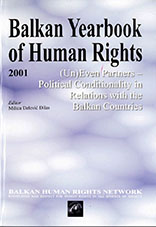Aid as an Instrument of Political Conditionality
Aid as an Instrument of Political Conditionality
Author(s): Milica DelevićSubject(s): Politics / Political Sciences
Published by: Balkan Human Rights Network
Summary/Abstract: Aid was rarely, if ever, allocated without political conditions attached to it. While previously predominantly seen to be serving national interests of donor governments, present day political concerns related to the grant of aid process are to a much greater extent geared towards upholding democracy and human rights as values the international (donor?) community deems as essential for its cohesion. 'Second' generation conditionality, as the practice of linking aid with respect for human rights and democratic principles became differentiated from economic conditionality developed before. This change, however, appears not only to have resullted from a deepening and maturing of the donors' commitment to democracy and human rights, but also from an understanding of political reform as being conducive to economic development. This essay will examine how political agenda developed to accommodate both politically-related economic concerns as well as genuine interest in political change.
Journal: Yearbook of the Balkan Human Rights Network
- Issue Year: 2001
- Issue No: 01
- Page Range: 252-265
- Page Count: 14
- Language: English

